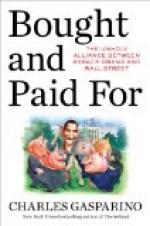“A woman who will suffer in silence while her brutal husband stands over her with a whip is a disgrace to her sex,” she exclaimed hotly. “She is no better than a shackled slave; her position in the man’s house is that of a concubine.”
“What shall she do?” cried Stafford with a shrug of his shoulders and a cynical laugh.
“Get a divorce,” retorted Virginia.
“Divorce!” echoed the railroad man mockingly. “The world is full of divorcees. Everyone looks down on them. They have a bad name. What does she gain by that?”
“Her own self-respect if not that of the world. Divorce is the only weapon a defenceless woman has.”
Stafford, badly beaten, relapsed into a sulky silence, while Hadley nodded approval.
“You are quite right, Mrs. Stafford,” he said; “the fear of divorce and its attendant publicity makes many a husband behave himself.”
Following up her advantage, Virginia picked up a newspaper lying on a table close by.
“Here,” she said, “is the opinion of a woman on this very question—a woman evidently who has herself suffered. She says:
“’How many beings live together for long years strangers in mind and body! How many are the slaves of marriage whose relations are hideous with mutual hate! Why, in the name of a religious principle, should one make eternal the hell whose torments are as varied as they are overwhelming? Why should not reason and the right of the individual correct the mistakes of chance, false calculations, and hopes deceived? Why should a woman who does not find in her husband the necessary moral support suffer the tortures of a long agony in which she is defenceless, of a perpetual struggle in which she is miserably conquered; and, on the other hand, why should the husband who does not find in his wife the hoped-for companion or the desired slave, find the road to happiness forever closed to him? Before divorce was established, men and women who lived together in misunderstanding suffered an agony worse than that of the condemned to death, for nothing can be compared to the torture of being tied, body and soul, in hatred or scorn, or even indifference.’”
Hadley nodded approvingly.
“I think she puts the case pretty well,” he remarked. “It’s a strong argument in favor of the legal separation.”
“I beg to differ,” said Stafford dryly. Rising with a yawn, he went on: “Half the marital troubles one hears about are the fault of the wife. She is often too exacting, too fond of meddling in her husband’s affairs. A man who respects himself bends to no one—not even to his wife.” With another yawn he added: “Will you two excuse me for a few minutes? I have a letter to write.”
Without waiting for an answer, he turned on his heel and walked into the library, closing the door behind him. Hadley puffed away at his cigar in silence, while Virginia gazed thoughtfully into the fire. Presently Hadley said:




